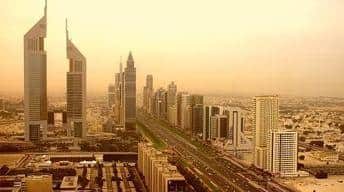Regulations Concerning Foreign Banking Entities in Oman
The Sultanate of Oman is the eastern most of the GCC countries, and it has a population of just over 4.5 million. The population of foreigners among those is around 2 million with steady growth expected over the upcoming few years. The country currently has a decent amount of oil, though it is a relatively small producer compared to some of its neighbors. Because of this, the country has had to diversify and find growth in different areas to the other nations in the region
The economy of Oman is one which is experiencing regular growth, and while the growth is not quite as rapid as it was a few decades ago, it is still occurring. The currency of the country is the Omani Rial (OR) and is one of the strongest and most valuable currencies in the world.
The financial and banking sector of the country is governed by the Central Bank of Oman (CBO), and it is their job to act as the governments’ bank. They must ensure a steady and healthy growth of the economy, and also produce the legislation for banking and financial service entities within Oman.
Initially the CBO came into power through the Banking Law of 1974. This law is quite similar to the current Banking Law of 2000 (Royal Decree 114/2000) which expands upon it. The original law put in place the basic duties and responsibilities of the Central Bank, and the current law made some important additions and updates such as including an Islamic Banking section.
On top of this, the law also goes into some detail regarding the regulations that govern banking activities of general banks
What are the Regulation Governing Foreign Banks?
The general regulations for foreign banks within the Sultanate of Oman are the same as those of national banks
Setting up a Foreign Bank:
Within Oman, there are 4 free zones. However, setting up a foreign bank is an activity that would not be possible in any of these zones, as there are no zones which allow for financial services or banking companies to be set up. As such, a bank would have to be set up in the mainland.
In order to perform business and banking related activities, a license would first have to be obtained. This is stated under Article 52 of the CBO banking law. There will be a daily fine should the bank choose to commence activities prior to obtaining a license.
In applying for a license, a foreign bank should be aware of what would be required of them in the application process. Article 53 section 1, 3, 4 and 5 relate to foreign banks.
-
Section 3 states that a foreign bank (this section is specifically for foreign banks rather than domestic) must provide a copy of their constitutive contract or articles of incorporation, and proof of their authority to perform banking activities within their domiciled countries.
-
Section 4 mentions that a ‘Plan of Operation’ is to be included and must include but is not limited to information concerning the geographical and commercial communities that the bank will serve, and the specific types of activities the applicant will be looking to perform
-
Finally section 5 states that anything else that the Central bank may prescribe within their regulations should also be included.
Once an application has been submitted, it will be scrutinized by the Central Bank and, as per Article 54 section c, if it is sound and follows the central banks guidance, it receive approval within 120 days
Once a foreign bank has received its approval and license, it will be free to commence banking activities, and will be subject to the typical regulations that any conventional or Islamic bank would subject to.
Minimum Capital:
All foreign banks within the Sultanate of Oman are required to have a minimum paid-in capital of OR 3 million at all times. This is required as initial capital, and must be maintained to be used as part of the banks business activities.
The activities that can be performed by a national bank are the same as those that can be performed by a foreign bank, so long as their license allows for this. Also the foreign bank will have to keep in mind laws from the nations in which they are domiciled in when performing activities. This is covered in much more depth under Article 65, which concerns General and Investment Powers of banks.
Article 72 confirms that all banks including foreign banks must produce and submit annual reports to the Central Bank, and these reports must be externally audited. Within this should be included the following:
-
List of assets and liabilities of the bank
-
Information showing the current financial situation of the bank both within and outside the Sultanate
-
The amount of foreign and domestic currency currently held by the bank
Revocation of License:
The Central Bank will be within their rights to revoke the license of any bank they deem to be acting in a way which is against the law, or is in any manner unsafe. This is mentioned in Article 14 section g, though in Article 83, it is expanded upon. Article 83 section b specifically states that the central bank shall be able to look into the activities and status of a foreign bank in its home jurisdiction in order to help it determine whether they can revoke or suspend their license.
Glossary
-
Central Bank of Oman (CBO): The Oman Central Bank is the governing bank of the country and is responsible for the maintenance and management of the country’s financial sector. Its duties include:
-
Managing and distributing the national currency of the country (the Omani Rial)
-
Ensuring the growth rate of the financial sector is as best as it can be and maintain the growth to acceptable levels.
-
To produce legislation and circulars that financial sector businesses including banks must follow.
-
Islamic Banks: An Islamic bank is one which follows and implements Sharia Law in all of its activities
-
Sharia Law: These are the customs and regulations that abide by Islamic ideas
-
Conventional banks: These are any non-Islamic banks
-
Royal Decree 114/2000: This is the banking law of 2000. Its sets out the basic responsibilities and duties of the Central Bank of Oman. It also contains some of the basic guidelines and regulations for banks within the country
-
Circulars: Circulars are released by the Central Bank if and when there are any important updates or points regarding banking business matters. They are made out to all banks and are available online
-
Free Zone: There are 4 free zones within Oman, and these are areas of the country that are no considered to be part of the mainland. They are purposely set up for business and allow for 100% foreign ownership.
 عربي
عربي
 English
English Русский
Русский 官话
官话 português
português
 Türk
Türk 





















